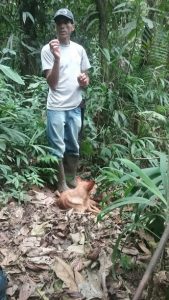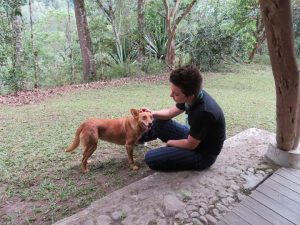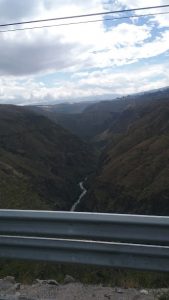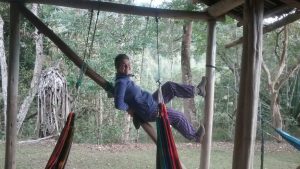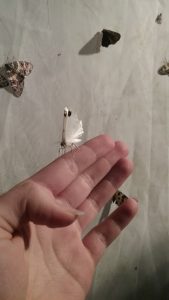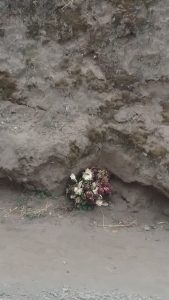It’s been almost a month since I arrived in Ecuador, and about a week since our first excursion. Since cultural immersion and experiential learning are the primary goals of this program, we have three scheduled academic excursion throughout the semester. Basically, they’re kickass field trips where we get to see some of Ecuador’s natural beauty and talk to activists fighting for social justice. The first excursion of the semester was to Intag, a cloud forest. It’s called that because… It’s a forest. With a lot of clouds. We were at a pretty high altitude.
We stayed at a lodge, ate a lot of amazing vegetarian food, went on a pretty intense hike, learned about indigenous tactics of resisting mining operations, and I bought a really cool hat from La Asociación de Mujeres, a grassroots organization of women that produces traditional wares to support their tribe.
Also, I met the love of my life. Her name is Capuccina.
Before we left for Intag, our program director told us to watch for spiritual experiences in the forest. So, I did! Here’s a list of the spiritual experiences I had at Intag.
- I ate a really good empanada that redefined the way I view empanadas
- that’s about it.
Some people feel an intense connection to nature. Some people love camping and never want to return to civilization. Some people would lay down their lives to defend the environment. Some people major in environmental studies.
I am none of these people.
As a child, I remember caring very deeply about plants and animals and large bodies of water. But as I got older (probably middle school), I realized that there were so many things that wanted me to care about them, and the environmental just… Slid down my list. Now, it’s actually difficult for me to be interested in environmental issues. I know that they’re important, but there’s this disconnect between the part of me that knows I should care, and the part of me that does care.
So being in Ecuador is an interesting experience, because, well. The Galapagos Islands and the Amazon are in Ecuador; biology was practically born in here. It has crazy biodiversity and unbelievable natural beauty. Ecuador’s constitution explicitly acknowledges the environment as an entity with inviolable rights (although whether the government actually honors that is, of course, a different story). The result is that students on my program tend to have a lot of passion for the environment, many of the subjects in our courses involve environmental justice, our excursions are in less developed areas, and many of the social movements in Ecuador center on the environment- especially the indigenous movement, which is much more prominent here than in the States.
This is not an environmental studies program, but there’s a lot more environmental justice than I would seek out on my own. Honestly, this is probably good for me! Being exposed to topics outside of my usual interests is how I grow.
All the same, I spent a lot of Intag reflecting on my emotional disconnect from nature. Sure, I was happy to be in this gorgeous place, and it hurt my heart to think of Intag being destroyed. But the passion, the urgency, just isn’t there for me. I’ve come to the conclusion that this is mostly a result of American capitalism and colonialism.
If you know me personally, you’re probably laughing a little, because this is a very Helena response.
I come from a culture and mindset that encourages the commodification of… Uh, everything, but expecially natural resources. Especially the consumption of natural resources as a solution to human suffering.
As for the colonialism bit:
The reason why indigenous rights and environmental justice are so strongly linked is that the environment is an integral part of indigenous culture, religion, and life. This is why our stereotype of Native Americans is some mystical nature guide. Indigenas aren’t magically more in tune with nature; it’s just part of their culture and spirituality.
Centuries ago, European settlers came to this land. It was not theirs. And because there was nothing in it that they valued, because their own religion told them to, they could use it without remorse or hesitation. They began destroying the Americas without even thinking that they could be wrong.
My complacency and complacent consumption are the results of this legacy. I’m not gonna white guilt myself or my readers cause let’s be real, white guilt ain’t productive; but realizing how much of my attitude has been shaped by my colonial ancestry kinda sent me reeling. I’m definitely going to be watching myself and how my understanding of this world continues to develop.
On a lighter note, more pics!!
